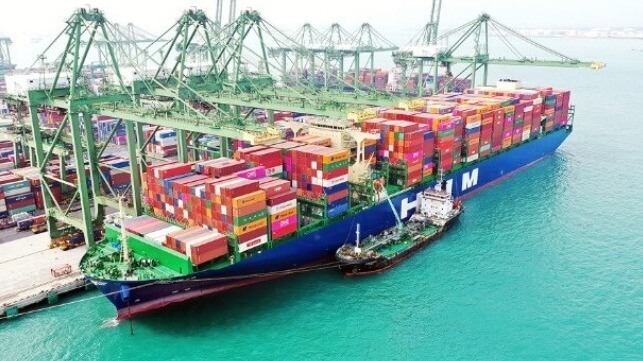Korea’s Oceans Minister Calls for Start of HMM Privatization

South Korea’s minister responsible for overseeing the government’s policy toward the shipping industry is calling for the privatization of South Korean shipping company HMM while the market remains strong. In an interview with South Korea’s Maeil Business Newspaper, Cho Seung-hwan, Minister of Oceans and Fisheries, said it does not help the industry for the company to be state-owned, especially at a time when the company is reporting strong profits.
HMM is currently ranked by Alphaliner as the eighth largest ocean carrier with a total capacity of just over 800,000 TEU. The company mapped out an aggressive growth plan last month as it recovers from years of financial losses which would see HMM reach the 1.2 million TEU capacity level by 2026. They are also planning to more than double the size of their tanker fleet from 10 to 25 VLCCs while in dry bulk they plan to grow the fleet from 19 to 30 ships also by 2026. The plan also calls for growing the company’s logistics business including terminals and intermodal operations.
Launched in the late 1970s, the shipping company was started as a regional operator of tramp steamers. As they expanded, the company in 1982 was branded Hyundai Merchant Marine but recently shortened its name to HMM as it worked to move past its troubled financial past. The company reported more than 20 quarters of losses before finally returning to profitability in the second half of 2020.
South Korea’s state-run Korean Development Bank and Korea Ocean Business Corporation stepped in 2016 to save the troubled shipping company from possible bankruptcy as its finances declined. Currently, the two organizations hold approximately 40 percent of the shares outstanding of HMM. However, in addition to the shares, they were granted warrants and hold convertible bonds. If all the convertible debt was exercised, the government through the two banks would hold more than 70 percent of HMM’s equity.
“Privatization will be extremely difficult and it will be challenging to find a strategic investor when the public sector owns too much stake,” the minister said in the interview published by Pulse. “It would be right to lower stake to a fair level.”
Speculation grew through much of 2021 of a pending move by the government after comments from the ministry and KDB supporting privatization. Last fall, an undersecretary from the ministry outlined a plan to the media for the government to begin to lower its position in HMM. At the time, he said the search for a buyer was already underway with the goal to also begin to convert and sell portions of the government’s holding into the private sector. Rumors have circulated of a possible merger with Korea’s SM Line after it was revealed the smaller carrier was buying shares of HMM. Management, however, has repeatedly said it was just an investment and they were not accumulating shares for a takeover bid for HMM.
“It will be ideal to liquidate some of the state stake before the shipping industry enters down or slump cycle,” the minister said during his interview. He, however, declined to specify any timing for the government to begin selling shares.
Fueling the speculation has been HMM’s strong financial performance. This week, HMM reported record results for the first half of 2022 with revenues up 87 percent and operating profits up more than 150 percent. Net profit reached $4.65 billion up from just $286 million a year ago.
Like other major carriers, they cited the strength of freight rates while also cautioning about the outlook. “Demand growth is expected to be under downward pressure due to considerable uncertainties mainly related to widespread inflation, rising oil prices, and the recurrent coronavirus situation, in addition to geopolitical tensions,” HMM said in its press release.
